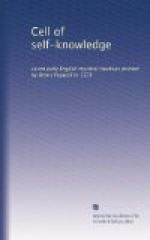“It happeneth,” she said, “that otherwhile[127] the devout fervour of a soul loving our Lord Jesu, either by some certain sin, or else by some new subtle temptations of the fiend, waxeth dull and slow, and otherwhile it is brought to very coldness;[128] in so much that some unwitty folks, considering that they be destitute from the ghostly comfort the which they were wont to have, leave[129] therefore the ghostly exercise that they were wont to use of prayer, of meditations, of reading, of holy communications, and of penance doing; whereby they be made more ready to be overcome of the fiend. For he desireth nothing else of Christ’s knights, but that they should put away their armour by the which they were wont to overcome their enemies. A wise knight of our Lord Jesu should not do so. But thus, the more he feeleth[130] himself dull and slow, or cold in devotion, the rather he should continue in his ghostly exercise, and not for to make them less, but rather increase them.”
Here is another doctrine of this holy maid, the which she used to say to herself in edifying of others:
“Thou vile and wretched creature, art thou worthy any manner of comfort in this life? Why hast thou not mind of thy sins? What supposest thou of thyself, wretched sinner? Is it not enough to thee, trowest thou not, that thou art escaped by the mercy of our Lord from everlasting damnation? Therefore thou shouldest be well apaid,[131] wretch, though thou suffer all the pains and darkness of thy soul all the days of thy life. Why art thou, then, heavy and sorrowful to suffer such pains, sith by God’s grace thou shalt escape endless pains with Christ Jesu without any doubt, and be comforted endlessly, if thou bear these pains patiently. Whether hast thou chosen to serve our Lord only for the comfort that thou mayst have of Him in this life? Nay, but for the comfort that thou shalt have of Him in the bliss of heaven. Therefore arise up now, and cease never of thy ghostly exercise that thou hast used, but rather increase to them more.”
Here is an answer by the which she had a final victory of the fiend, after long threats of intolerable pains:
“I have chosen pain for my refreshing, and therefore it is not hard to me to suffer them, but rather delectable for the love of my Saviour, as long as it pleaseth His Majesty that I shall suffer them.”
Here is a doctrine of the said virgin, how we should use the grace of our Lord:
“Who so could use the grace of our Lord, he should ever have the victory of all things that falleth to him. For as often,” she said, “as any new thing falleth to a man, be it of prosperity or adversity, he should think in himself thus: Of this will I win somewhat. For he that can do so, shall soon be rich in virtue.”
Here followeth notable doctrines of this holy maid, taken of her sermon which she made to her disciples before her passing, and the first was this:




